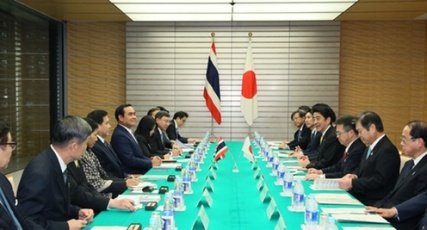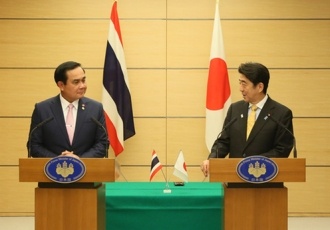Japan-Thailand Relations
Japan-Thailand Summit Meeting
 (Photo: Cabinet Public Relations Office)
(Photo: Cabinet Public Relations Office)
 (Photo: Cabinet Public Relations Office)
(Photo: Cabinet Public Relations Office)
 (Photo: Cabinet Public Relations Office)
(Photo: Cabinet Public Relations Office)
On February 9, commencing at 6:00 p.m. for approximately 50 minutes, Prime Minister Shinzo Abe held a meeting with H.E. Mr. Prayut Chan-o-cha, Prime Minister of the Kingdom of Thailand, during his visit to Japan. The overview of the meeting is as follows.
Following the meeting, a Japan-Thailand Joint Press Statement (PDF) summarizing the outcomes of Prime Minister Prayut’s visit to Japan was issued at a joint press conference.
summarizing the outcomes of Prime Minister Prayut’s visit to Japan was issued at a joint press conference.
1. Political and security areas
(1) “Proactive Contribution to Peace”
Prime Minister Abe explained that this year marks the launch of ASEAN Community and 70 years since the end of World War II, and Japan intends to continue to contribute as a peaceful state to the peace and development of the international community under the policy of “Proactive Contribution to Peace” based on the principle of international cooperation. Prime Minister Prayut replied that he supports Japan’s “Proactive Contribution to Peace” policy.
(2) Security and defense cooperation
Both leaders shared the view that security and defense exchanges will be promoted through opportunities such as the Cobra Gold Exercise that will be held in Thailand this week.
(3) Thailand’s democratization
Prime Minister Abe said that establishing a stable political structure in Thailand is important, and once again called for the prompt return to democracy. In response, Prime Minister Prayut said Thailand is pursuing domestic stability and national reconciliation, and he explained Thailand’s ongoing efforts toward prompt restoration of democracy in line with its Road Map.
2. Economic areas
(1) Railway cooperation
Both leaders welcomed the signing of the Memorandum of Intent on Cooperation of the Railway Sector between the two countries’ transport authorities, and shared the view that the two countries will promote concrete cooperation in the future.
(2) Dawei development
Prime Minister Abe said that based on the importance of the Dawei development project in southeast Myanmar, Japan intends to begin the procedures to meet the necessary conditions for equity investment in the Special Purpose Vehicle (SPV), along with pledging to dispatch Japan International Cooperation Agency (JICA) specialists and implement a study on road construction. Prime Minister Prayut welcomed Japan’s participation and said Thailand would like to work with Japan going forward.
(3) Investment environment
Prime Minister Abe explained the importance of maintaining and enhancing Thailand’s business environment so that Japanese enterprises are able to make long-term investments with ease, and requested to take appropriate measures based on specific requests from Japanese companies regarding the Government of Thailand’s investment incentive measures. Prime Minister Prayut said he hopes to respond in a constructive manner while taking Japanese companies’ requests into consideration. The two leaders also welcomed the signing of the Memorandum of Cooperation promoting investment of Thai companies to Japan.
(4) Restrictions on food imports
Prime Minister Abe called strongly for a prompt abolishment of restrictions on food imports from Japan that were imposed after the Great East Japan Earthquake for the remaining three prefectures (Fukushima Prefecture, Gunma Prefecture and Miyagi Prefecture). Prime Minister Prayut responded that he intends to positively consider the request based on the relevant data and other information.
3. Cooperation in the international arena
The two leaders exchanged views on counter-terrorism in light of the murder of Japanese hostages in Syria, the Regional Comprehensive Economic Partnership (RCEP) negotiations, maritime-related issues and United Nations Security Council reform, and shared the view that cooperation between the two countries will move forward, including through Prime Minister Prayut’s participation in the Third UN World Conference on Disaster Risk Reduction (March, Sendai) and the Seventh Mekong-Japan Summit (July, Tokyo).

